Business
How to be Successful Running a Restaurant Franchise, A talk with Cliff Bramble [Podcast]
Published
3 years agoon
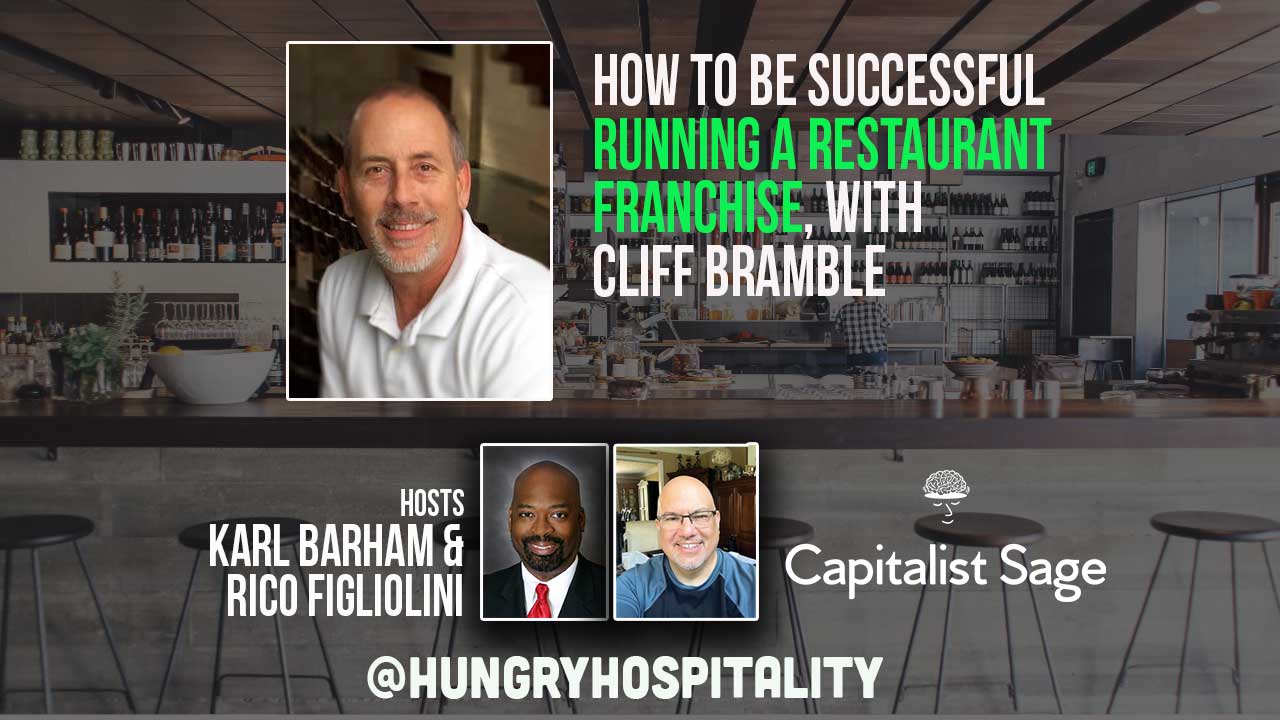
Sounds easy. Buy a franchise and you’ll be trained and off you go. There’s more to it than that. Cliff Bramble, founder of Hungry Hospitality, restauranteur, author of several books including, the Business Side of Restaurants, and found of Coursini – an online restaurant industry academy – shares his inside knowledge about what it takes to run a franchise.
Resources:
Hungry Hospitality Website: https://www.hungryhospitality.com
The Business Side of Restaurants Book: https://www.hungryhospitality.com/store/p14/Sample_The_Business_Side_of_Restaurants.html
Coursini: https://courses.restaurantindustryacademy.com/pages/welcomelanding
Timestamp:
[00:00:30] – Intro
[00:02:30] – About Cliff
[00:04:24] – Marketing a Franchise
[00:09:18] – Business Structure and Systems
[00:09:42] – Basic Tips on Better Bookkeeping
[00:17:38] – Budgeting, Scheduling, and Forecasting
[00:18:59] – Hiring the Right People
[00:20:45] – Training and Caring for Employees
[00:25:06] – Hiring in Non-Conventional Ways
[00:28:47] – About Coursini and Cliff’s Upcoming Book
[00:31:04] – Closing
“The consistency is key because it is part of training and honestly, part of the reason why I came up with some of these courses is the consistent training. If you hire somebody, and you continuously have turnover, you have to ask the question, is it you, or is it the person training? It’s a consistent message that will keep people employed and hopefully excited about their job.”
Cliff Bramble
Podcast Transcript
[00:00:30] Karl: Welcome to the Capitalist Sage Podcast. We’re here to bring you advice and tips from seasoned pros and experts to help you improve your business. I’m Karl Barham with Transworld Business Advisors, and my co-host is Rico Figliolini with Mighty Rockets Digital Marketing, and he is the publisher of the Peachtree Corner Magazine. Hey Rico, how are you doing today?
[00:00:48] Rico: Hey Karl, great. It’s been a beautiful, sort of a beautiful week. I mean, we’ve had some storms. We’re going to end up in the freeze zone soon, I think. But glad that we’re back on track with the Capitalist Sage with a great guest today. But before we get to that, I just want to mention our sponsor is Peachtree Corners Magazine. The sponsor of the family of podcasts that we do this one, including Peachtree Corners Life and Prime Lunchtime with the City Manager. So check those out. You can find those podcasts anywhere you listen to podcasts, on iHeartRadio, Spotify, and others. Or watch the video podcast on YouTube or our Facebook page.
[00:01:26] Karl: Excellent. Well, Rico, this is our fourth year now. We are starting our fourth year doing the Capitalist Sage and providing information to folks here in Georgia and Peachtree Corners area, as well as out there in the internet world. Just talking business with local business owners and folks that share some of their wisdom and knowledge and experience with our audience. Today, it is my privilege to introduce a return guest, Mr. Cliff Bramble, a local Peachtree Corner resident. And he’s also the founder of Hungry Hospitality, LLC. He’s a local business owner and an author of several books on business and restaurants and many other things. And today we’re going to get a chance to talk about some of the success secrets of operating successful food franchise businesses, and some of the tools that people should be considering and thinking about in 2022 to make their business better, stronger, more resilient than ever. Cliff, how are you doing today?
[00:02:26] Cliff: Fantastic, Karl, thank you very much for having me on. I really appreciate it.
[00:02:30] Karl: Oh, our pleasure. Why don’t we start off, tell a little bit about your history. Folks that may not know you, tell you a little bit about your background and some of the stuff that you’ve done.
[00:02:39] Cliff: Well, I don’t want to go too far back, it’ll make me look like I’m really old. So I’m just going to start with the last like 20 years. But in the last 20 years, I previously owned Noble Fin here in Peachtree Corners. And unfortunately COVID really shut me down pretty quickly over there. But before that I was a co-founder of Rathbun’s restaurant from 2004 a ll the way until 2020. So that’s about 17 years over there. And it was a great ride. We opened up Rathbun’s, Kevin Rathbun Steak, Krog Bar, KR Steak Bar. And then before that I worked for Buckhead Life Restaurant Group in Buckhead in a place called Nava that was happening for many years. And I’ve owned a couple other businesses before that. And then I was in California before that opening up hotels in Southern California. All the tough parts, La Jolla, San Diego, Rancho Mirage, Palm Desert. You know, it was all the tough parts.
[00:03:30] Karl: I hear you. Well, we got you back here in Georgia now, and we’re really grateful for that. Why don’t we jump in on this topic that we wanted to chat about. When I talk to business owners all the time, there’s a large amount of folks that own and operate franchises. One of the most amazing things to me, franchise is a great opportunity for those that want an established structure and brand that they can focus on executing and operating a business, and they don’t have to think of everything from scratch. But one of the key components to success is really just the fundamentals of operating a business and especially a restaurant or a food based business. And so I’m wondering if we could talk a little bit about some of the things you’ve learned in running, especially a restaurant food business that you think a lot of franchise folks don’t really get about being successful. Anything that comes to mind to start?
[00:04:24] Cliff: Well, the first one would be the marketing. Simply because I have had one or two franchise clients over the years, and the marketing is always the most important factor, especially when it comes down to individual owners owning a franchise. So I say marketing is always the first one.
[00:04:44] Karl: Absolutely. Well, let’s talk about marketing for a little bit before we jump to the next one. Most franchises, one of their selling points is we help you with marketing and there’s, whether it’s national campaigns going on or they might provide marketing materials and signage and logos and so on. What are some of the things that you think as an individual local business owner, they should be focusing on and investing in marketing? Why don’t we start about with how much would you recommend people invest? How much of their revenue, or do you have any ideas around that? And then what specific things they could be doing?
[00:05:17] Cliff: Well, yeah, there’s a little percentage wise that people have spoken about over the years saying 1% of your sales really goes to marketing or advertising. I say marketing rather than advertising. But for the local people, the most important part of the franchise and especially being a local franchise. I have not been one, but as far as somebody being in the local, is really knowing your surroundings. And now people can spend a lot of money on marketing, but if they’re doing social media and they’re collecting people’s information. For example, if they are restaurant, and even if it’s a small bread company, for example, or a small little sandwich place. Everybody who’s walking in, if they can get their customer email and their phone number and know them, you know what having that as a social media base and a direct marketing so they can send people information is a huge benefit.
[00:06:07] Karl: When I think about businesses, especially when we look at selling a business, we typically talk about their marketing strategy they do. Something that’s appearing more and more now, they talk about the number of followers, their digital marketing there. So, as an actual asset, it’s not something you can touch and feel, but it is an asset in the business that can be quantified. And what you’re talking about, capturing their information, getting them to follow them on social media, can actually have value beyond just generating more sales.
[00:06:38] Cliff: There’s no question about it. And I’m just finishing up a book called the Marketing Side of Restaurants. And I will tell you, one of the areas in there, one of the chapters is specifically on this. And the reason I say this is because there was somebody who, a client that I had previously, it was a hair salon. And I’ll give a quick example, the hair salon, they were wondering why they were having problems. Number one, they weren’t making enough money. That was the first problem. So I said, all right, let me come in and check it out. And as I looked at everything, I said, okay what do you want to do? And their response was, we want to close this and we want to move up to another place and it’s up the street, because it’s a better location. So ultimately I said alright, where is your database of all your individuals, all your clients? We don’t have a database. All we have are first names and we have some people’s phone numbers. So my response was well, if you move, how are your customers all going to know where you moved? You know, so, in a matter of a very quick time, because they had so many people’s phone numbers, they ended up getting people’s names, numbers, using them on Facebook, using them on Constant Contact, even MailChimp. And it really helped them tremendously.
[00:07:45] Rico: Are you finding anything different over the last year or so with marketing because of COVID even? Has any new innovations happened over the last year or two?
[00:07:54] Cliff: Well yeah, there’s a lot of innovation, especially for the restaurants. You know, for example, when you go and pay at the table now, and a lot of people hand you a little handheld, you can actually punch in your email into some of those as a loyalty program. So the loyalty programs are very good to have, especially on a smaller franchise. Because the loyalty, people feel like they’re getting something out of that too, rather than just writing down an email. But the loyalty side is a good factor. And that has come in, into full force right now.
[00:08:22] Karl: I know the top line of revenue is always important and franchise owners very often will just a hundred percent depend on the franchise to do their marketing. If I’m hearing you right, doing your own marketing and development, they don’t help you with all of it. They may give you the tools, but if you don’t use them, you’re not really going to get the benefit.
[00:08:42] Cliff: Well, you know, it goes back to that whole, you can lead a horse to water, but you can’t make them drink. Somebody told me many years ago, if you have a guest in your restaurant, and if you call them by their name seven times within that time that they’re there, they will be back within a week. And that’s a huge factor of getting to know the people. And I know, a lot of franchises will pay the 4 or 5, 6% every single week or every month, depending on how they have it set up. But knowing the local market is very important too. And I think that as the smaller franchisors work in their area, they know their customers rather than the franchisee who may be six states away.
[00:09:18] Karl: So after marketing, what would you say would be the second thing that you see franchise owners of food businesses missing when they’re going out there and trying to be successful?
[00:09:29] Cliff: Well, a lot of it has to do with the structure. People have to have structure in their business and that goes with any area. So they have to have structure of the invoices coming in. They have to have a system and having those systems in place are highly important.
[00:09:42] Karl: You’re absolutely right. Let’s expound a little bit more on the systems that people have. There’s a management of kind of cash and making sure that it’s accurate your financial systems in there. Anything that you think, tips that you’ve learned along the way that helped you to be successful in understanding money coming in and out?
[00:10:02] Cliff: Absolutely. Number one is the first part is the invoicing, because if you don’t have a system on your invoicing those invoices come in, they come in every single day. If you don’t have a system, the invoice comes in, it goes to the invoice box, it gets checked, it gets designated to a special account. And then it gets logged into the chart of accounts into the computer, the accounting program, and then it gets filed. If you don’t have that set up, you’re just going to have a problem because at the end of the month, you might think that you did fantastic. But you may be missing five or six invoices. Knowing that is in my opinion, highly important. And having somebody in the bookkeeping side know about that area is very important too.
[00:10:39] Karl: Well, let’s talk about bookkeeping because that is one huge pet peeve of mine. Oh boy. When you think about a business, I always equate accounting and bookkeeping to your scorecard. So if the data that’s going in is wrong and there isn’t attention to it, what it’s producing for you to be able to make decisions is going to be flawed at best and possibly cause you to fail ultimately. Why is it that so many people have struggled with this bookkeeping stuff?
[00:11:07] Cliff: I honestly, I think sometimes they’re afraid of it, you know. But you’re always afraid of what you don’t know. They always say if you know something, you’re always going to go back to it. So if you were promoted to a chef, but you were first a general manager, you’ll always be able to go back to that general manager. But when you really break it down in the accounting side and bookkeeping, there’s really only three areas that you have to look at all the time. You have to look at your general ledger because whoever’s punching that information in, if they are punching it in the wrong code, for example, it’ll show up on the general ledger. So in addition to that, they also have to look at their income statement and they have to pay attention too, and not just look at the top sales line and the bottom profit or loss. And hopefully it’s a profit. Maybe there’s a fear of tackling it, but only taking five minutes every single month to look at this information, isn’t really enough. You have to look at your balance sheet. You have to look at your general ledger and you have to look at your income statement. But you have to be excited about it too. And there’s not enough people who are excited about numbers, unless they’re making money.
[00:12:10] Rico: Let me ask you something, between industries too is it a little different, little easier bookkeeping? For example, restaurants, point of purchase sales. It’s coming in on the iPad or whatever you’re taking it in on. So it’s going straight to your bookkeeping at some point, right? Automatically.
[00:12:25] Cliff: It goes straight to the point of sale system. So the income goes to the point of sale system. So you can just run a report every single night. But if you own a hair salon, the same exact thing goes. There’s somebody who’s punching in the sale every day. At the end of every day, they run a report on the point of sales. The key to that Karl, is closing out your sales, every single day. You have to do it. If you don’t do it, you’re just going to run into a problem.
[00:12:49] Karl: Isn’t it similar to the analogy of if you have a closet or a room in the house and you don’t clean it every week, and then at the end of the year, you’ve got to go in and clean all of that. That’s kind of how some people run their bookkeeping. They wait until the end of the year they had invoices. They had expenses that have come in, in February. And it has PFL or something. They don’t know what it is. They end up with large miscellaneous expenses because they didn’t track it. But I think your key point, there is a combination of knowledge which can be learned. Talk to us a little bit about how can people get better at basic, you don’t have to be an expert. What are some things that can help them get better at learning how to read enough financial statements so they can run their business successfully?
[00:13:36] Cliff: It’s interesting that you ask that because I just started something called Coursini, which is a, it’s geared to franchises. There’s a whole page that’s geared to franchises as well, but basically they’re online courses and they’re courses on balance sheets. There’s courses on general ledger, it’s really simple information. And these courses, for example, they’re available online. You can take them for 10 minutes, 20 minutes at a time. You can take them on an airplane. But the nice part is, you’re learning something about it. You can read from a book. But I will tell you, in my opinion, the courses are really good. The courses are good and one more thing I want to mention about this is that on a weekly basis, the franchisees or whoever it is running their business, they should have a cashflow statement printed pretty much every single Friday. That will help them a lot. And you know what? It may make them more interested in those reports.
[00:14:24] Rico: As far as the bookkeeping part goes, because I do my own invoicing. But I have a bookkeeper that comes behind me. So every month she’ll spend two or three hours a month to make sure she cleans up whatever I’m doing. And to prep the file, so this way we don’t have that problem at the end of the year, at the end of the quarter. And I use QuickBooks, I can go on my app on my phone. I can see what my balances are. I can see what my costs are. I could look and pull reports right off my phone. And I’m sure even the point of purchase stuff can be integrated into a QuickBooks or some system like that. Where it just comes straight across and it doesn’t take a rocket scientist to do some of that. Right. I mean, is that?
[00:15:02] Karl: Absolutely. I know ways that people can get their bookkeeping pass down to 15 minutes a month if they set up their chart of accounts. And if you don’t know what a chart of accounts is, you need to learn something, take a course or get a book. The general ledger, once you set up your chart of accounts, you can with Quickbooks Online, and some of the other tools that are NetSuite and others, you can automate probably 90% of the transactions in there. Once it’s set up, you go in and you check to make sure that the numbers are right and so on. And it simplifies the bookkeeping. The other part is a regular cadence, weekly or monthly reviews of it. Whether it’s your bookkeeper that you outsource, whether you do it yourself, allocate an hour to go through that. And there’s the old saying of balancing checkbooks. Nobody does that anymore. Well, each month you should balance out your QuickBooks for the month to make sure you have a P and L statement that’s accurate to reflect that month, the profit and loss statement. But these systems are some of the core things, if you’re in a business, it is your scorecard. And just investing more time, money, resources, to get competent enough to know whether your accountant or bookkeeper is doing it right, is really important to success.
[00:16:18] Cliff: You know, as a business owner, I’m going to tell you this you, you mentioned it right on. The bookkeepers, they’re great. They are doing what they’re doing. The accountants are doing what they’re doing, but you know what, they’re only as good as what the information is that you give to them. So I always say double check your accountant. Because they’re going to appreciate it, and you are too. You may not be able to double check the depreciation side, but at the same time, you can check everything else from the charter, from the general ledger. That general ledger there is your best friend. And if everybody looks at that at least once a month, the information gets punched in from the bookkeeper or the owner of the business. They just have to pay attention to it.
[00:16:57] Karl: And this is an area that franchises don’t cover. When you go on franchise training for two weeks, they do not go into detail on bookkeeping. They say, you have to do that on your own. So finding other courses, resources to get yourself educated is key. Even if you choose not to do it yourself, you should at least understand what a general ledger is, what it looks like. The cash flow statement, balance sheet, and a P and L statement. If you know what those four things then, and the general ledger, you’re in good shape. Let’s go on with structure a little bit more. Let’s talk about the people side. What kind of structures do you see being really important for people to master in running a franchise food business?
[00:17:38] Cliff: Well, the structures, they have to have the budgeting. They have to know about the scheduling. And they have to deal with the forecasting as well. So that’s one area, I say that’s one area all together. There’s three areas in one. If they’re creating a structure with their budgeting and they’re doing the same thing every single week. Every Friday they get their cashflow, every Monday they maybe send out all their checks. And they’re doing the schedules every single week and the schedules are based on their sales. So the sales go back to the budget. It all kind of works all hand in hand.
[00:18:07] Karl: This is the key thing. I think what you’re describing, I typically call a planning function. And if you want to have a predictable output, it always starts with a plan. I’d hate to try to build a house kind of ad hoc. Usually people would sketch out the bathroom should go here and the kitchen should go here and they build it from what’s in the wall first. And then they finish it at the end. With a business, having a plan of knowing what you’re going into, how much labor you’re going to need, what’s your material costs. So each week you can compare it to what you planned, some target. If you typically spend $5,000 a week on food. At the end of the week, you check if you’re 3000, you did better. If you’re 7,000, you want to know why. If you start getting multiple weeks of that, you can make an adjustment or a correction before the end of the month where you now have to register a loss.
[00:18:57] Cliff: Bingo. That’s exactly right.
[00:18:59] Karl: These are critical things. What about on the people side? Hiring, onboarding. I’ve seen franchises give you some guidance of how to hire people, but I don’t know if they do as good a job on how do you onboard people and train them. Especially in the food business where turnover tends to be higher than some other businesses.
[00:19:18] Cliff: Exactly. Well, you know, when it comes down to the hiring. Again, you have to have a system in hiring. Right now, the system for hiring is people just looking for people. They need bodies. And, but at the same time, there’s a lot of people hiring and you’ve got to hire the right person. Because if you hire the wrong person, there’s a saying out there it’s easier to hire somebody, it’s tough to fire them. And in Georgia, that might be a little different as a right to work state. But you want to hire the right people and you want to interview the right way as well. And somebody came up to me the other day and I said, oh, how was your interview? They said, boy, I couldn’t get a word in. And I said really? That’s interesting. I said, you couldn’t get the word in. And uh, you know, I said, it’s supposed to be the other way. So when you hear that, it’s important to hire the right people, make sure they have the right skill set. And also, you know, once they’re on board, make sure you’re training them the right way. And that goes back to the structure as well. Because if you’re not training them and you’re just handing them a key and you’re saying, okay, this is what you do. You know what, those first five days, that new employee is going to make up their mind whether they’re going to stay or whether they’re going to go.
[00:20:19] Rico: The idea that you were saying, it’s easier to hire than fire. When you hired the wrong person that team member poisons the rest of the team. You know? So, that’s one. And that’s hard to reverse. And then the other side of that is, especially in the food business I’ve got to believe, the chef may be doing a great job, but because that server brought it out badly and didn’t get it to you the right way, you might have a bad experience, right?
[00:20:45] Cliff: Yeah, you’re absolutely right. And part of the training, and I mentioned this before in my courses online on Coursini, I can tell you that one of them is human resources. One of the courses is human resources, and I had to break it down into five parts simply because of the fact of, there’s one on hiring. There’s one on payroll. There’s one on taking care of the employees. You have to take care of the employees. You have to train them, you have to care for them, you have to have some empathy these days. There’s a lot of variables that are going into what’s hiring and Rico, you asked earlier what’s changed? You know, the hiring has changed too. Because when people show up and they have a mask on, you don’t really know what to do. It’s a little, it feels weird. And then you say, okay, they see you without a mask and they ask you, is it okay if I take my mask off? And so right there, the, you have to have something that kind of lets the casualness come back and feel a little more comfortable because it is a little odd these days.
[00:21:38] Rico: Yeah. That can be interesting, interviewing someone wearing a mask. You never see their face.
[00:21:47] Karl: It is, but I think you’re highlighting something there, Cliff. The owner of the business and most small businesses franchise are operator owned. And they set the tone for the business. So if you have a mask policy and the owner or the manager, doesn’t wear a mask, it’s really hard to get other people to follow it. They’re going to follow the lead of the leader. The other part of that is, is you talked about the five sections of kind of, training around employees. There are some laws out there you’ve gotta be familiar with so that you don’t cross the wrong line. And franchises often don’t cover that in training because every state laws are different. So knowing how to handle unemployment, workers’ comp, how to handle harassment issues and protect yourself, making sure you’re covering labor laws, overtime. There’s a whole bevy of laws that you need to be aware of. You don’t have to be a master of, but you need to be aware of, and you need to let your managers know, and your employees know these specific things. If you’re going to have employees in your business.
[00:22:48] Cliff: The other big part about that, Karl, is right now with so many people working from their home and a lot of people have just said, okay I might be employed in Georgia, but I’m going to go travel. They’ve given up the house. And next thing you know, they’re living somewhere else. So what you have all of a sudden, you have to sit back and say, okay wait a minute. They’re living somewhere else, do I pay payroll taxes in Georgia? Or do I pay it in Texas? Where do I actually pay them? So then they’re going to, sometimes it’s easier to look at, there’s a PEI company where you can actually start looking at hiring people under something else rather than yours. But these days, Rico again, to your point earlier, what’s changed. For a lot of companies and I don’t know how many franchises have individuals who work either out of their office or out of state. But they have to look at and make sure they’re paying people the right payroll tax per state code as well.
[00:23:35] Karl: Absolutely. The other aspect is values of the business. Rico talking about service and so on. If that’s important in your business, clearly articulating the values and service expectations consistently with the employee base is critical. And if you’re suffering from turnover where every, three to six months, you’re bringing on new people, you need a system in place to constantly train and retrain those people. And it’s gotta be something that’s on demand and that’s accessible, et cetera for that. So these are some of the things, investments, that people should be considering in 2022 if they really want to start seeing major shifts in performance in their business.
[00:24:20] Cliff: Well, the consistency is key because part of training and honestly, part of the reason why I came up with some of these courses is the consistent training. If you have, and I’ll give you a good case. If you hire somebody, and you continuously have turnover, you have to ask the question, is it you, or is it the person training? In addition to that as an independent for example, if you’re a franchisee or franchise and you’re doing the training, that’s great. But what happens when you step away? Is somebody training them the same exact way, and there’s no way for you to quantify that or unless you’re having tests and you have a structure. But the on demand courses that are out there right now, and especially what I’m doing with the Coursini, it makes it easy. And it’s consistent and it’s a consistent message that will keep people employed and hopefully excited about their job.
[00:25:06] Karl: I’ve seen some of these systems, people could invest in under $10,000 a year under $20,000 a year, yet avoid much higher costs from either non-compliance or not being able to cover all the topics because managers are doing three or four jobs at a time. There’s a lot of hidden costs in not addressing this training slash putting these systems in place for their business. So it’s definitely something folks should think about and consider going forward. Since COVID has changed the nature of work. And when we’re seeing this shortage of workers and all these other types of things impacting franchise, is there any tips you could share with recruiting and hiring how to find people in non-conventional ways? I understand ZipRecruiter and Indeed, and everything could be done online. But sometimes you find the best people through your networks elsewhere. What are some of the things people could invest in to help with that?
[00:26:08] Cliff: There’s a million different ones online. There’s a few, there’s one I won’t even mention the name, but I know if I put something on there, I’ll get a hundred resumes from a hundred different states in all different countries. And so you want the right one. But the one area that works the best is the employees that are working there. Ask them for their friends, because people like to work with people that they know. And they’re not going to bring in somebody who’s a slacker, for example. They want to work with people who are actually good people. So in my opinion, asking those individuals if they could recommend any friends, is a very important aspect of maintaining, retaining your employees. It has to be people who are good and they want to work with each other. But when you start looking elsewhere, I always say this, you’ve got a 50-50 shot when you’re hiring somebody from the outside. You’ve pretty much almost got a hundred percent shot when you’re hiring somebody, who’s a friend of somebody who works there. But more importantly, you have to take care of all the employees. You can’t go to your employees if you’re just not the best manager. And you’re always asking them to bring people in, because they’re going to say well, I don’t know if my friend’s going to want to work with the person. Treating the employees and hiring, they all go hand in hand. You have to take care of the people.
[00:27:20] Rico: It almost sounds like, if you’re getting it from a team member they’re invested in that team. Cause you don’t want, talking about before, you don’t want someone that’s going to be a slacker, let’s say. And then everyone’s looking at that one person saying we’re doing and all the work he’s like always taking a 10 minute break doing something else. But yeah, no. That makes a lot of sense. I’ve found that referrals from personal people makes a lot more sense.
[00:27:41] Karl: And in our business, we actually pay for referrals. So if one of the team members refers somebody successfully, we pay referral bonuses for folks and as part of that. But I think you’re hitting on the key point. The work that needs to be done first is making sure that you’re an environment that people want to refer into. Think about it this way, if your own employees are not excited to refer people to come work with them, what you’re looking at is probably employees that are at risk to leave. If they’re getting feedback, there was a time where people used to get employee surveys or feedback. You don’t have to hire a fancy company to get feedback, have lunch with your employees, ask them how things are going, ask them their opinion, ask them how you can improve and how the business can improve. Or you can do a survey yourself, but get the feedback so you could improve the things that might be poisoning some folks in that work environment. It could be a manager that you love, but treats everybody else terribly. You need to get that feedback, that 360 feedback, to help address those.
[00:28:46] Cliff: Great points. Absolutely.
[00:28:47] Karl: Listen, Cliff, I really appreciate some of the insight that you shared with us today. I do realize that when you’re operating food businesses, it’s already challenging with very slim margins. You get some help with a franchise, owning a franchise. But we wanted to make sure people realize whether you own one today or you’re thinking of owning one in the future. There’s gaps in the information that you get from the franchise. Not intentionally, they just can’t cover everything. And supplementing that with whatever resources, investment, and time and money to help train yourself and your managers and your team. And Cliff, some of the work you’re doing and sharing out there and what you’ve developed and what other people have developed is really helping to hit that. Why don’t you tell us a little bit more about Coursini and the franchise course that you developed? And share how can people find out more.
[00:29:39] Cliff: So they can go to Coursini.Com It’s a C-O-U-R-S-I-N-I.com. It’s really made of mini courses. That’s really how I came up with the name. It sounds like it’s Italian, but I don’t think it is. Basically there on the franchise side, there’s a franchise about 40 different courses in there from finance to marketing, to hiring individuals, to running a business, starting the business. I mean, there’s a lot of stuff in there and so we’ve made them really reasonable on a subscription basis. In addition to that, I’m just finishing this book. It’s called the Marketing Side of Restaurants. This is the last of the two of the series. The other one was the Business Side of Restaurants. This one here is a, it’s a less than a hundred pages. And you know what, it’s all on marketing. There’s so much information in here. And part of it, was again, I go back to the franchise or any restaurant or any small business owner. There’s so many individuals that have a tough time marketing. And this book really tells them what they need to do on a pretty much social media basis, on a publicist basis and also a collection of people’s information so that they can actually get to know their people, the customers a lot more. So it’s a good thing, you know, and the goal is online courses, 24/7, on demand. And through the Coursini classes, I mean, you could be on the beach and taking these courses. And the feedback that I’ve received from the individuals who have taken the courses has been really great. So there’s videos in there, there’s tests in there, there’s all kinds of information and we’re excited to get it going.
[00:31:04] Karl: Excellent. I’m glad that we have someone here in Peachtree Corners that’s helping to share some of the knowledge that they have and more importantly, help serve the business community. If you own a small local franchise or a business, and you have a gap in training and getting information to folks, please do check out and support Cliff here in the community, as well as really look at it for your own self. How are you investing in you and your team to be better in 2022? You’ve survived the pandemic, at least the bulk of it. Now it’s time to thrive in your business. So, we want to thank Cliff Bramble, founder of Hungry Hospitality, LLC. And we want to thank you for your insights and sharing your experience with us once again.
[00:31:46] Cliff: Thank you very much for having me.
[00:31:48] Karl: Our pleasure. Well, today I just want to say Rico and I are glad to be starting off our fourth year doing the Capitalist Sage Podcast. I’m Karl Barham with Transworld Business Advisors of Atlanta Peachtree. Our business advisors are available to help consult on your business, whether you’re looking to improve it, grow it, and exit your business. We consult on your business, help you with evaluation, but really help you with your plan for the future. We kind of think of ourselves as a form of retirement advisor for business owners. One day you may want to step away from the business and having a plan in place and a resource in the community here that can help you with the sale of your business or acquiring a business. It’s just part of the strategy for success. So reach out to us at www.TWorld.com/AtlantaPeachtree. Or you could email me Karl Barham KBarham@TWorld.com. And I’d love to set up a consult with you to talk through any issues you might be having in your business. Rico, why don’t you tell us a little bit about what you’ve got going on?
[00:32:48] Rico: Sure. First, I want to say thank you to Cliff again for being on the show. I always learn a lot from Cliff. It’s amazing. No really, truly, I’m serious. And Karl too, because I learn a lot from you too. And I wish I was in the restaurant business, crazy, but yes. I’m happy where I am. So I’m good in publication.
[00:33:14] Cliff: You could get a job though. There’s a lot of people looking for restaurant people right now, I’ve heard.
[00:33:20] Rico: Yeah. Yes. I could do that $15 an hour job. At least they raised the wage a little bit, so that’s helpful.
[00:33:26] Karl: They have.
[00:33:26] Cliff: Don’t be fooled, they make more than that.
[00:33:29] Rico: Yes, I know with the tips and everything. But I’m glad where I am. I publish Peachtree Corners Magazine, and that’s fine for me right now. In fact, I’m looking at launching a second publication. I will have more news about that in a month or so. But besides that I do Mighty Rockets, which is a digital marketing company. So if you’re looking for video production, photography, content, Social media management. You could reach out to me, just find me on LinkedIn. It’s Rico Figliolini. And that’s easy to spell if you know how to spell it, F-I-G-L-I-O-L-I-N-I. I’m one of maybe two or three on there. So it’s easy enough to find me. The other one would be my brother and he’s in Canada. So you can’t use him. He’s not in this business. I’m excited because we’re working on the next issue. We’ve just put out our largest, 88 page issue just this month. Actually beginning of December, we’re working on a next issue right now, which is the best of Peachtree Corners and Reader’s Choice Award. So we’re in the midst of a survey right now. And so far within a week, we’ve had over 400 respondents on it. It’s going to be a nice.
[00:34:31] Karl: Rico, why don’t you tell us how do people access the survey? Where can they find it?
[00:34:35] Rico: Sure. So if you go onto LivingInPeachtreeCorners.com, you’ll scroll down just a little bit and you’ll see a graphic that says Reader’s Choice Award Survey, and you can take that survey there. And five of those that actually participate in this, will get a $75 cash Visa gift card later, drawn at random. So this way, some incentive for coming in. Give your opinion of best restaurants, summer camps. I could have made this a really long survey. So I, but I didn’t. I kept it down to a certain categories. But do that. And the next thing that we’re actually launching right now, and I just posted it online is Faces of Peachtree Corners. So we’re going to choose 20 people, from 12 and up that have a great story to tell what they’ve done, giving back to the community and all that. So check that out also, and nominate someone if you think they’re worthy enough to be there. But that’s where I’m at and this is always a great conversation to have.
[00:35:28] Karl: As I’ve been driving around too, just a heads up for folks, I notice a lot of the local schools are having open houses over the next couple of weeks. I think Wesleyan and Cornerstone, if you’ve got young kids looking for schools, it’s that time of year where people are starting to think about schools for next year, next season. So check out online and all the local schools are having their open houses right now. Greater Atlanta Christian and all the other private schools and public schools. Go check them out.
[00:35:56] Rico: Amazing how many schools serve this area that aren’t even in Peachtree Corners. Woodward academy, there’s a bunch of places, Brandon Hall. So Wesleyan obviously. Greater Atlanta Christian, Cornerstone, of the private schools anyway.
[00:36:08] Karl: Absolutely. Well, we want to thank everybody again. Tune in, we have a great schedule of guest speakers and guests for the show for this year. We’re going to keep doing this and sharing, talking about business. It’s kind like inside baseball, inside business for Peachtree Corners and surrounding areas. So thanks everybody for your support and look forward to talking to you.
Related
Business
The Forum Gives Sneak Peek of New Eateries and Community Spaces
Published
2 days agoon
July 24, 2024
If you’ve been to or near the Forum in the past few months, you’ve probably noticed cranes and construction crews. The anticipation of the first phase of renovation of the 22-year-old retail center has left a lot of Peachtree Corners residents as well as nearby patrons excited to see changes.
The Forum administration invited the media for a hard hat tour on July 17. The event showcased the redevelopment progress ahead of The Plaza’s grand opening on Aug. 8.

Scrumptious bites incoming
Executives from the development and leasing teams joined on-site management and led attendees around the new central gathering space, guest amenities and Politan Row, the newly created 10,000-square-foot food hall.
Dining concepts from veterans at Sheesh, Twenty-Six Thai and newbie Gekko Kitchen were the first food vendors announced for the space, which is expected to open in January.
“We can’t wait to introduce the Peachtree Corners community to our food hall experience,” said Politan Group CEO Will Donaldson in a news release. “Every detail from the design to the bar program to the cuisine is thoughtfully curated to inspire guests to not only mingle with one another but to connect with our incredible restaurateurs and discover new favorites.”
During the tour, Donaldson explained that eventually there will be seven different global cuisines in the Politan Row food court at the Forum featuring well-known and up-and-coming local talent. Once complete there will be a central bar, a private event venue and a covered outdoor patio.
“One of the things that we’re excited about is this unique design that we’ve come up with, that’s very specific to this area,” he said. “We’ll be open seven days a week for lunch and dinner. Whether you’re with a group for lunch or with your family, it works great for multiple settings.”
Twenty-six Thai owner Niki Pattharakositkul said the restaurant will work with local vendors to source the freshest meats and produce possible.
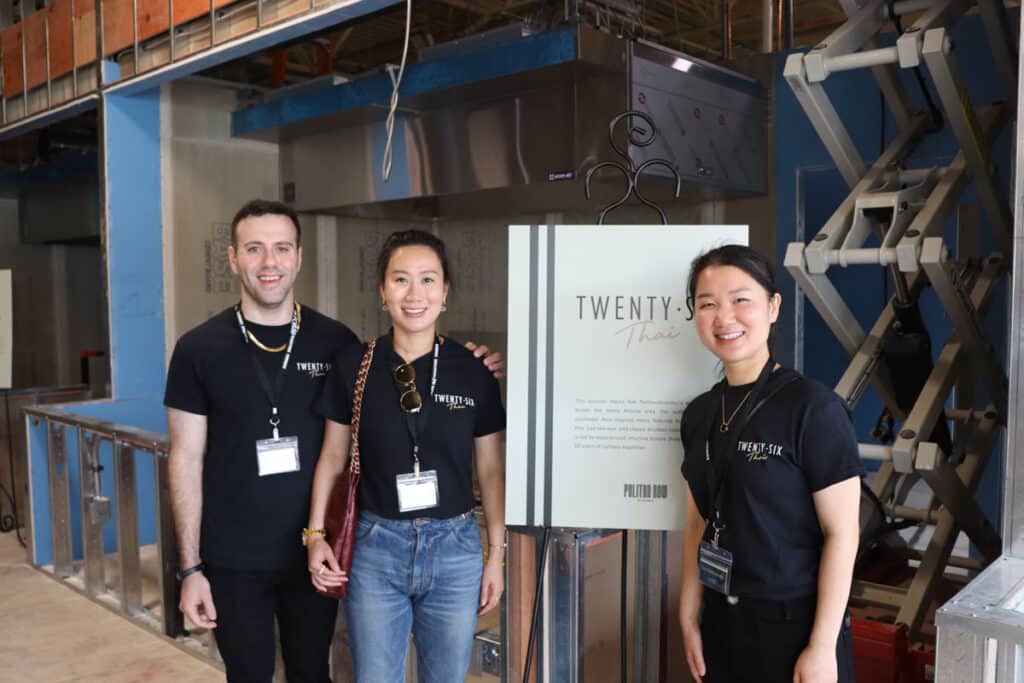
“There are certain types of produce and protein we try to source locally, but sauces and the more exotic produce and herbs, we have to import from Thailand,” she said. “Our brand is trying to move towards doing things locally and sustainably.”
Working with organizations such as Georgia Grown limits the use of large food distribution companies. Since starting Twenty-six Thai in 2016, Pattharakositkul has launched seven locations across metro Atlanta, including at Politan Row’s Ashford Lane and Colony Square.
The eatery describes itself as an “authentic wok-fired Southeast Asia-inspired menu featuring items such as pad Thai, pad see ewe and classic drunken noodles.”
Sheesh, a Mediterranean concept that uses simple, wholesome ingredients prepared with unique spices and blends, is run by corporate executive chef Charlie Sunyapong and director of operations Raquel Stalcup. The two are also members of the group behind full-service restaurants Stäge at Town Center and Pêche at the Forum.
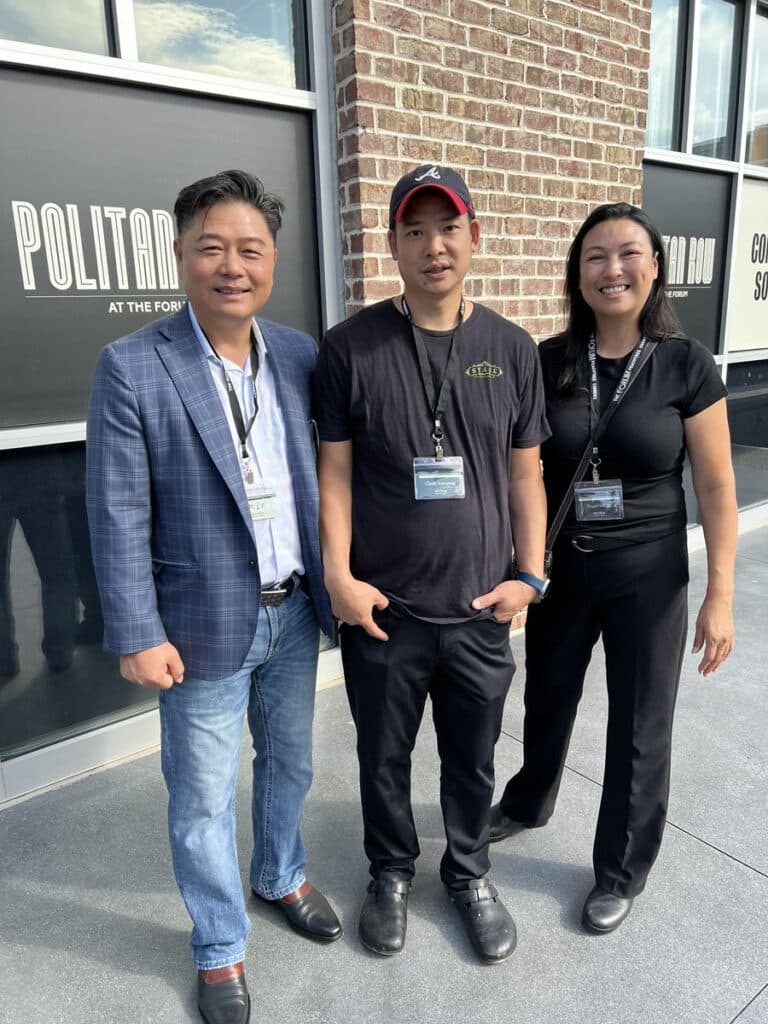
The popularity of those suburban concepts has already taken off. With Sheesh, they’re looking to do something different.
“There are going to be some things that are unique to Sheesh that you’re not going to get at the other places,” said Sunyapong. “You’re not getting a whole restaurant; this is quicker fare.”
Gekko Kitchen, a former food truck transformed into a hibachi and ramen experience, will be serving fresh, fast bowls that are more colorful and lighter than traditional hibachi fare.
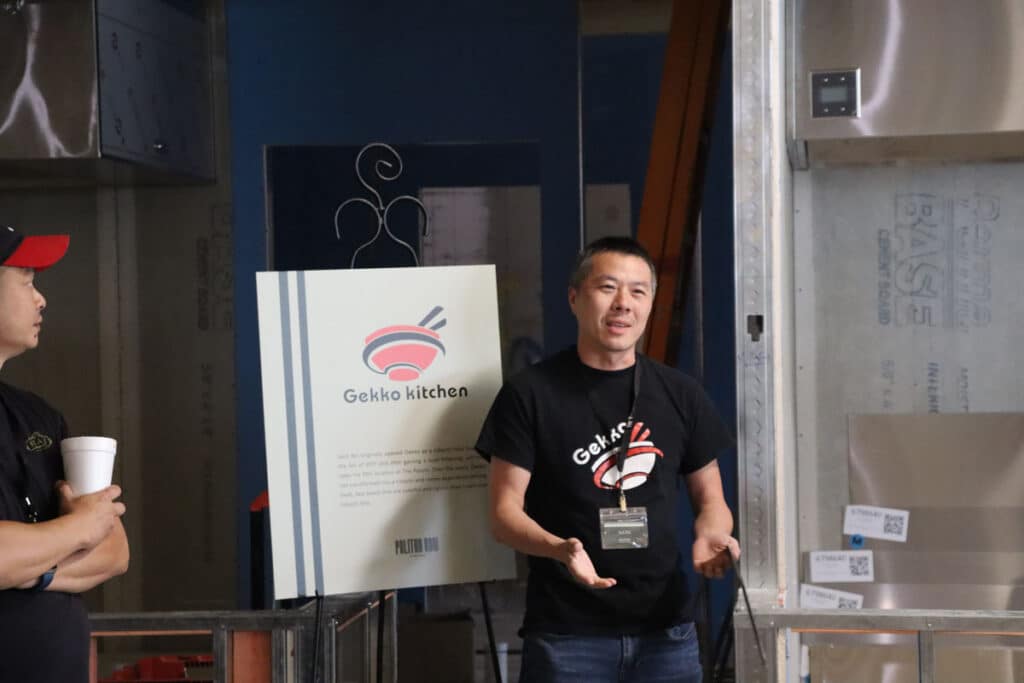
Gathering spots
Development Manager Nick Lombardo explained that NAP is moving away from building big construction projects from scratch like Colony Square in Midtown Atlanta and Avalon in Alpharetta.
“As a company, North American Properties pivoted around 2020 from building big ground-up construction to more redevelopment with already existing properties,” he said. “With the thought of great assets that just need a little more attention Infused into them to create value, we bought the Forum in 2022.”
He said that value-add propositions done at The Forum will create a more walkable center.

“Trying to compete with the internet on convenience is a very tough task, so the way we differentiate is by experiences,” he said. “We host between 150 to 200 events every year. We have things like concerts, wellness and fitness events and we have child playtime events. Our marketing team does a great job and they’re the differentiator when it comes to what makes our property stand out.”
By the first week of August, a large gathering space will be unveiled in the central area of the property between Pottery Barn and seafood restaurant Pêche. It will have a nine-foot LED screen capable of hosting movie nights and sports viewing. There will also be musical performances featuring local artists.
“We’re not in competition with Town Center,” said Charlotte Hinton, marketing manager at The Forum. “Town Center has gates like a real music festival and we’re more like a ‘chill and enjoy the music’ vibe where you can grab a beer and hang out or maybe kind of walk around.”
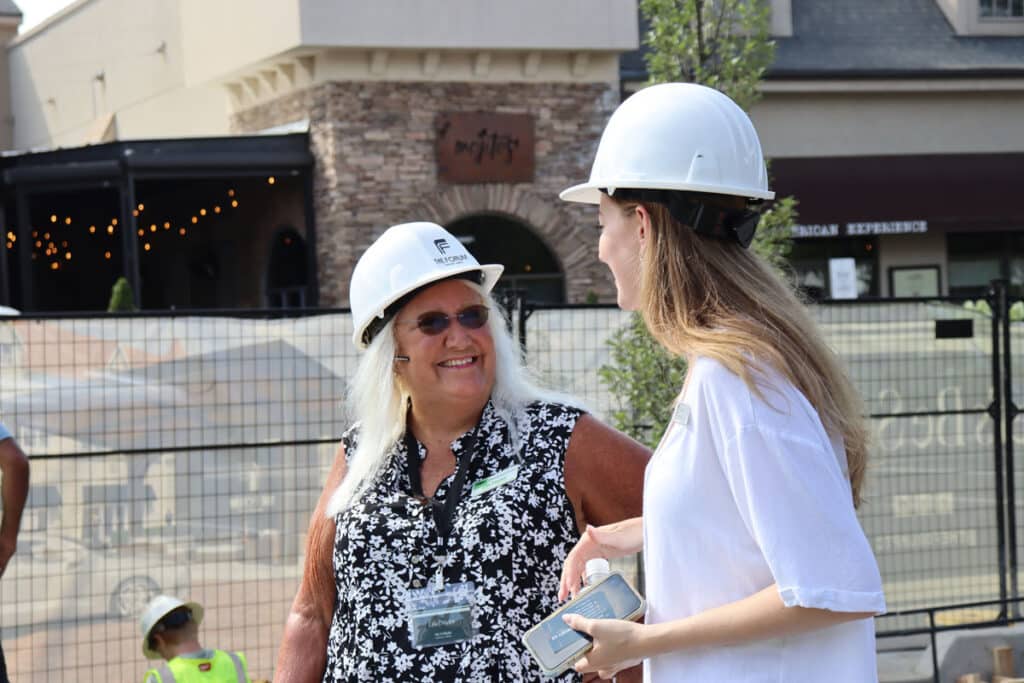
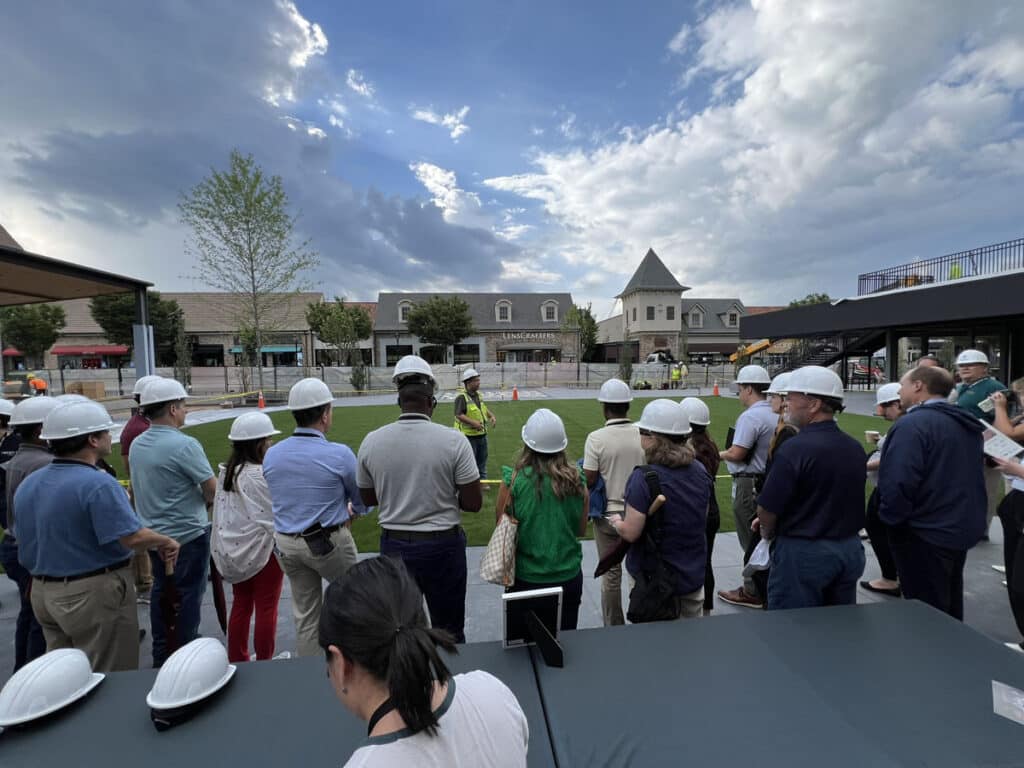
The smaller space and artificial turf are unlike the Town Center space where attendees spread blankets and bring chairs. The Forum will have furniture and seating in the space so folks can just gather and either enjoy time with family or partake in events.
The Forum will also offer valet parking on a limited schedule at that end of the property.
More improvements
Although the construction equipment will have moved out, the jewel box building will house a yet-to-be-named restaurant that will open early next year.
“We’re pretty much done with what we’re doing as far as landlord work,” said Lombardo. “We ask our tenants to bring their brand and their design and their material pallet and put that on the building to express their brand identity. They know their brand better than we do. They know how to best design their building and how it functions and works.”
It’s the same process with retail stores, he added.

“We always ask all of our new tenants to come in here when they’re building their storefront,” he said. “They’re not just selling their clothes; they’re selling a lifestyle in the brand so we ask them to push their brand out to the street.”
Even with the new spaces, there will be no shortage of parking, Lombardo added. “There’s plenty of parking behind these buildings,” he said pointing toward Pêche. “What we’ve done is enhance the connectivity to those areas. We’ve redone this breezeway and we’re adding lighting and connecting the parking lot to the main boulevard here. The goal is to replace cars with people and activity and bring a sense of community to the property.”
Related
Business
Taste of Peachtree Corners: PCBA Showcases Local Restaurants
Published
1 week agoon
July 17, 2024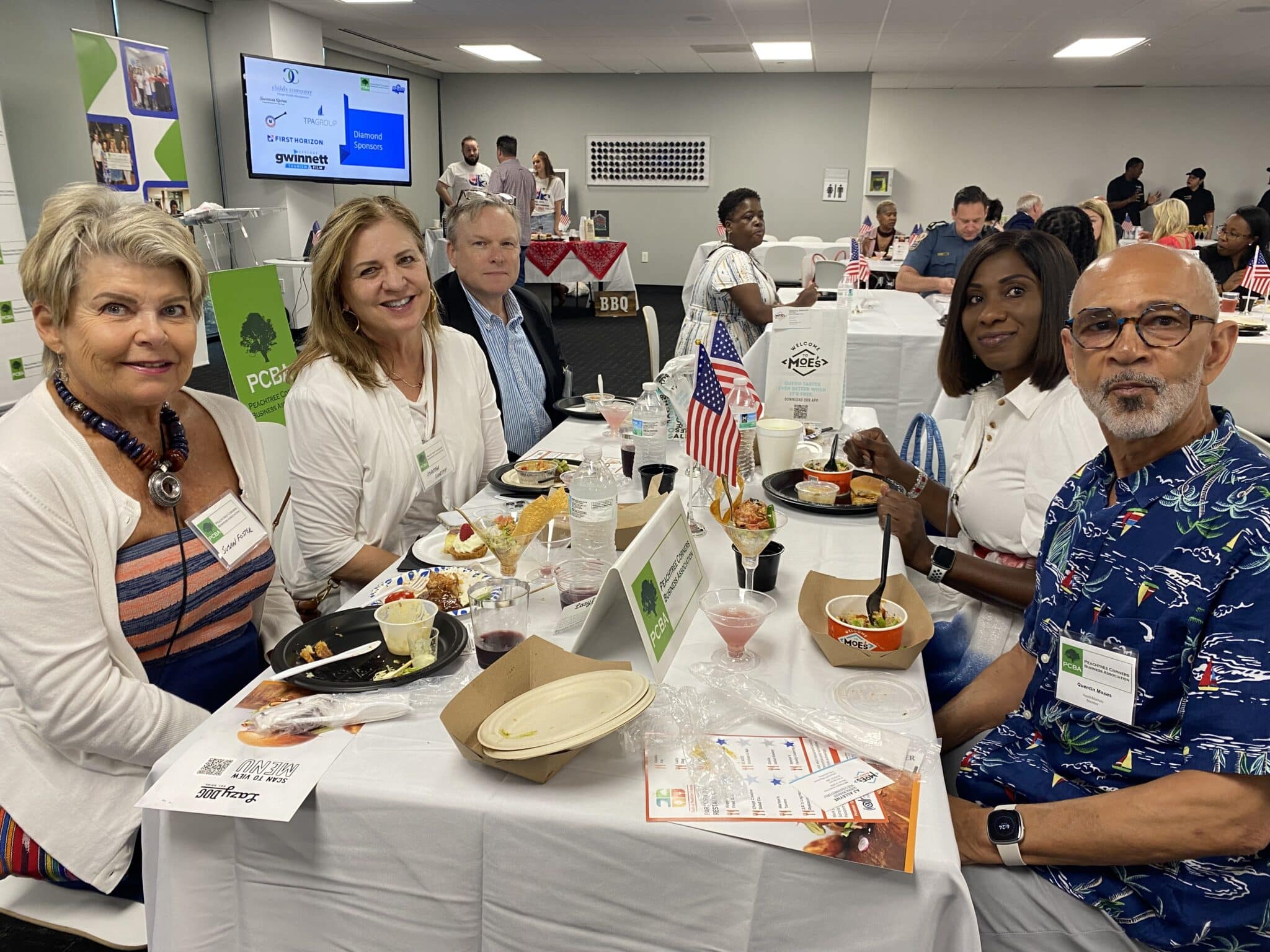
The Taste of Peachtree Corners has been in the works for years, but the COVID-19 pandemic put many key events on hold for the Peachtree Corners Business Association (PCBA).
But luckily this year, the dedicated staff of volunteers successfully executed a memorable event and introduced a lot of local business owners to their neighboring restaurants and caterers.
As I walked up to the Community Chest Room at Peachtree Corners City Hall on June 27, there was a line outside the door. I later found out that over 100 people had registered to attend the event. I got checked in quickly and was faced with a “passport” of 10 Peachtree Corners restaurants serving everything from high-end bakery items to good old-fashioned barbecue, and modern twists on seafood and American cuisines.
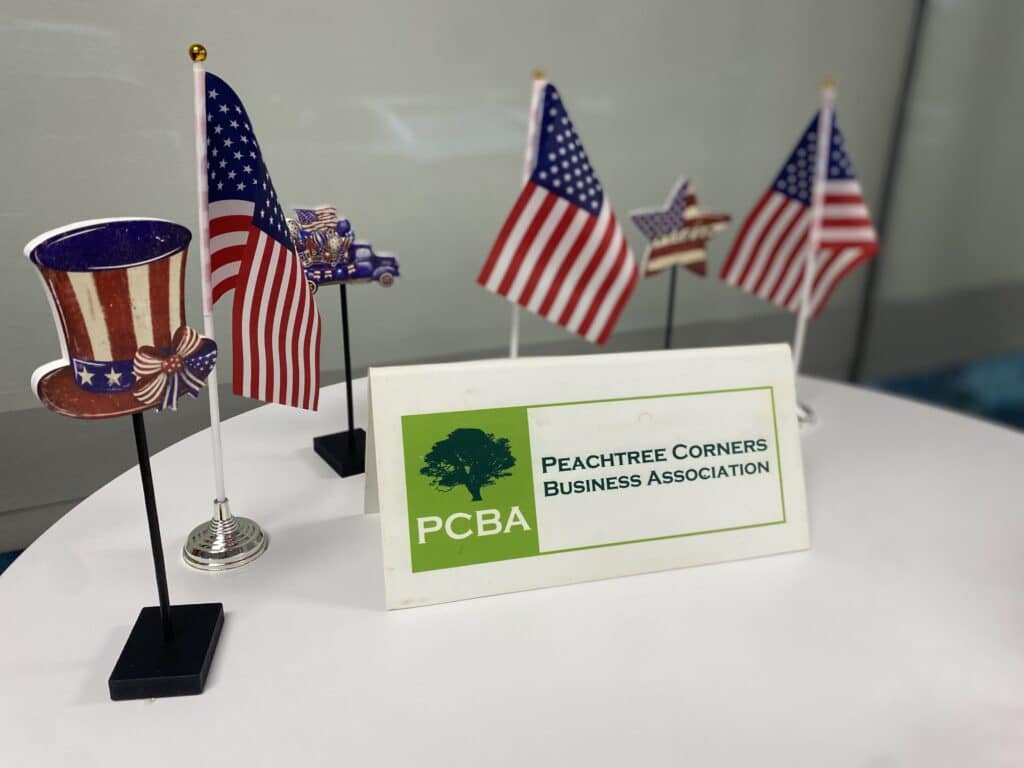
Let’s talk about the food
The idea was to visit all 10 restaurants and collect stars while trying samples and small plates. My first stop was Firebirds Wood Fired Grill, and they had my favorite – homemade chips and queso. The queso was smoky and mildly spicy with a great depth of flavor. What a great start. Next up was Chopt. Creative Salad Co. I had never heard of this restaurant before, but they blew me away with a perfect amuse-bouche of cherry tomato, pesto, mozzarella, and olive oil. These guys understand simple and fresh Mediterranean flavors.

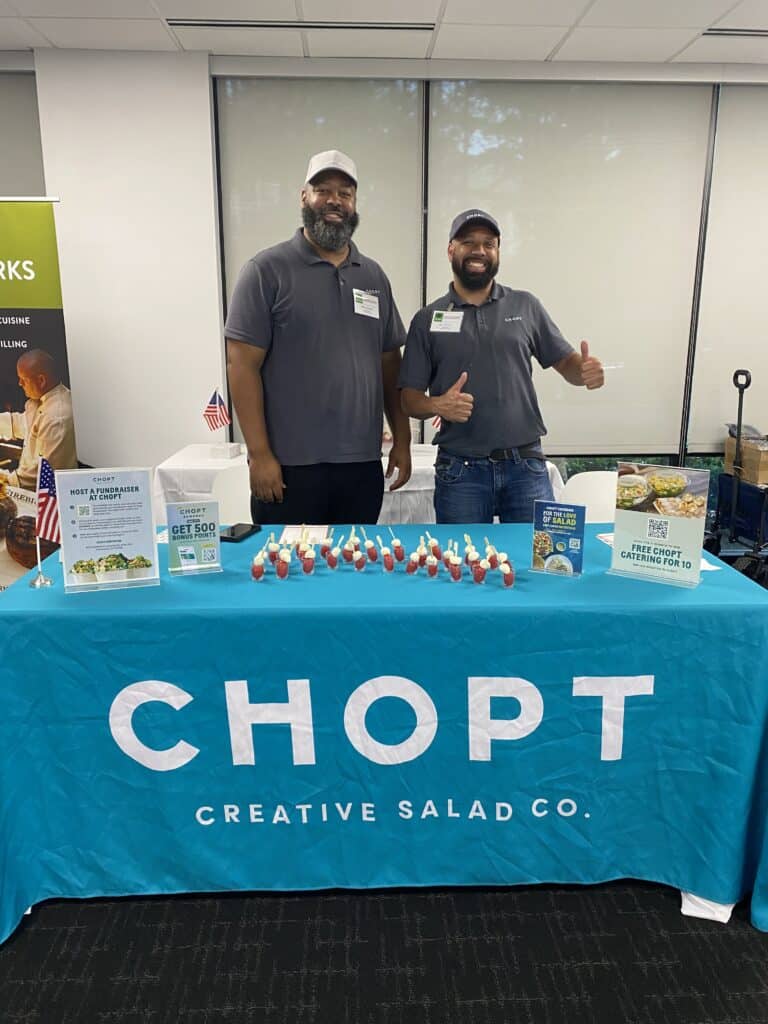

The folks from Marlow’s Tavern were also on-site serving shrimp and grits with jalapeno, spinach and tomato beurre blanc. This is definitely the style of elevated food I’ve come to expect from Marlow’s. And as a nice touch, they prepared a refreshing blueberry cocktail.
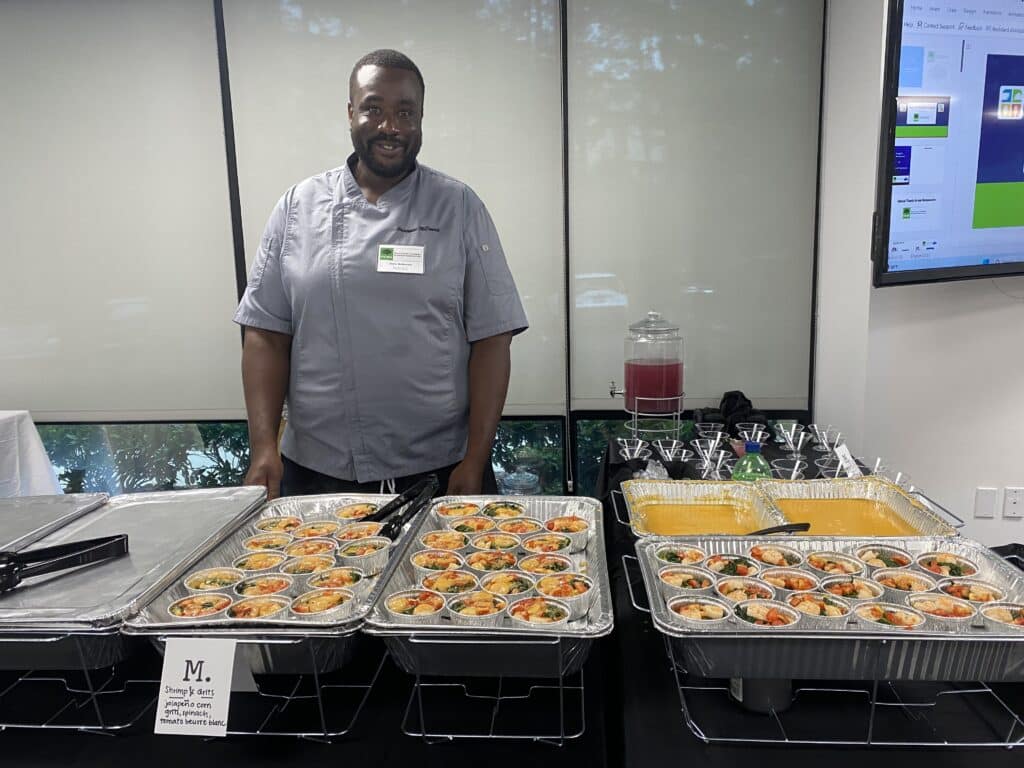

Another familiar face was set up on the other side of the room. J.R.’s Log House Restaurant served southern favorites like pulled pork sliders, baked beans and mac n’ cheese. I couldn’t pass this one up. The pulled pork was tender, tangy and saucy. Exactly what I want from a barbecue. Lazy Dog’s table really impressed me with its presentation. The tuna cup with rice, avocado and chili with chips on the side, was a real stunner.
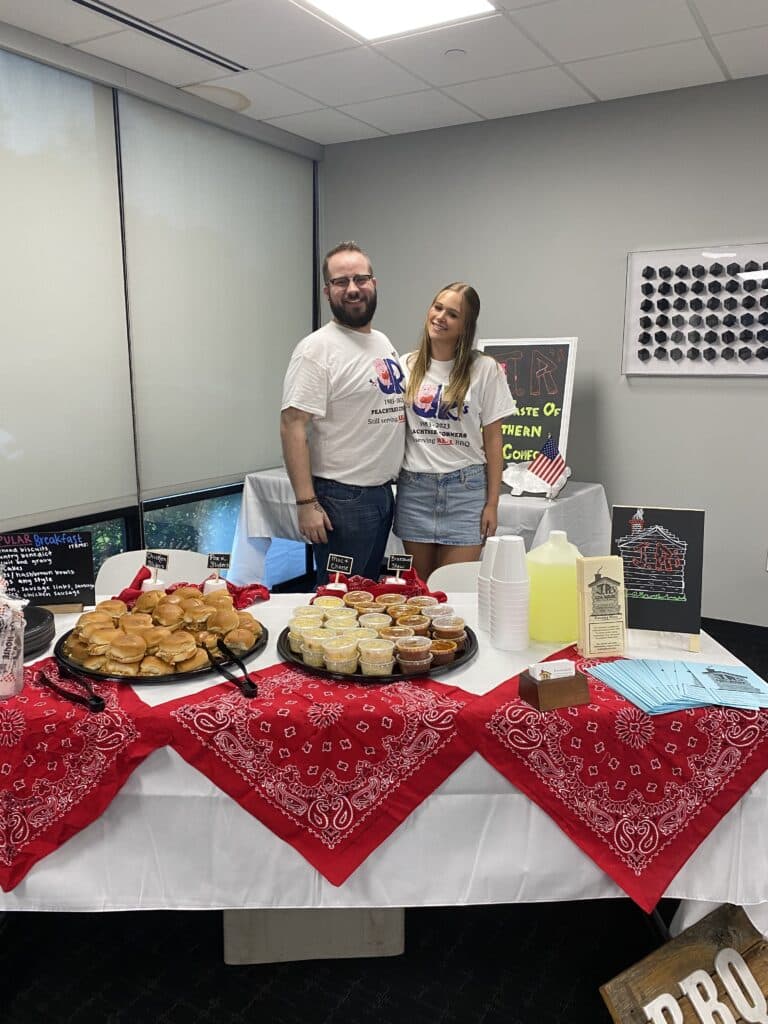
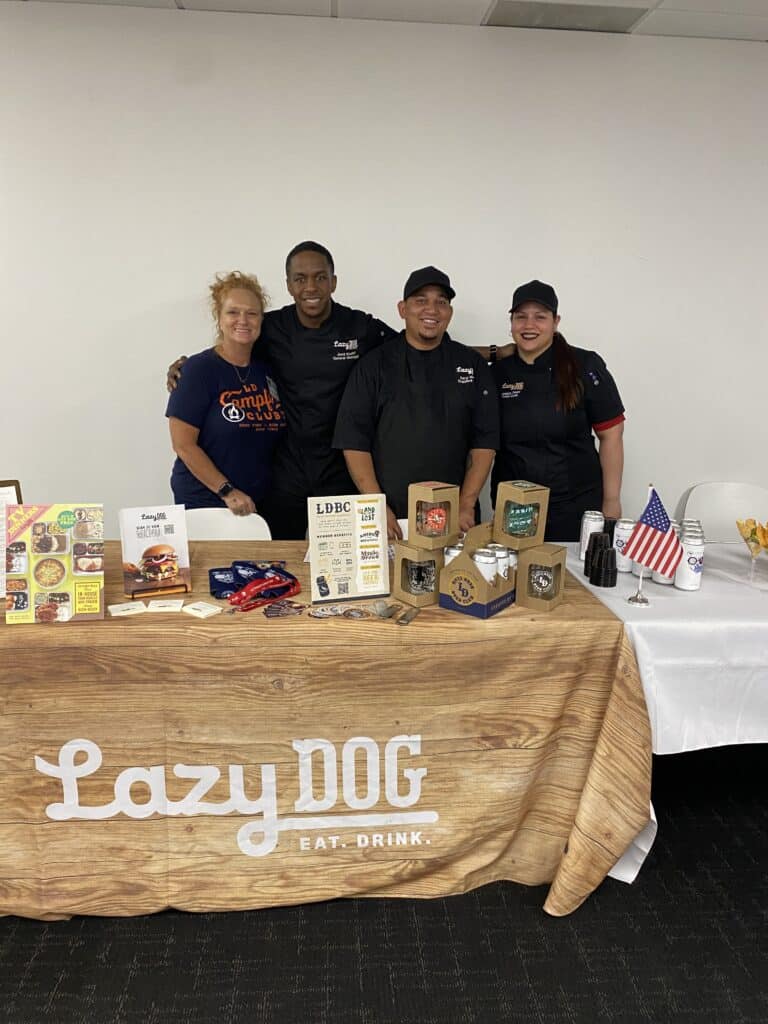
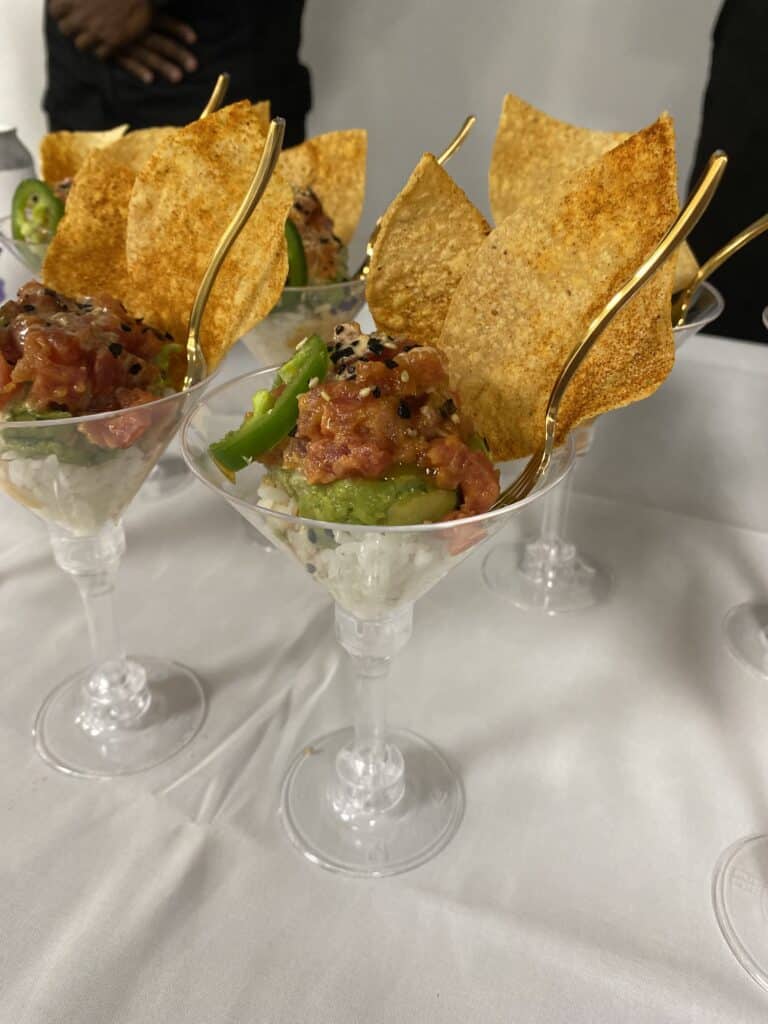
Moe’s Southwest Grill was also on-site handing out tasty tequila lime chicken with rice, avocado, and black beans. This super hearty and comforting entrée was followed by a seafood course from PECHE Modern Coastal. Crab cakes with a croissant pinwheel, roasted garlic and lemon aioli and arugula were on the menu and the flavor combinations were simply fantastic.
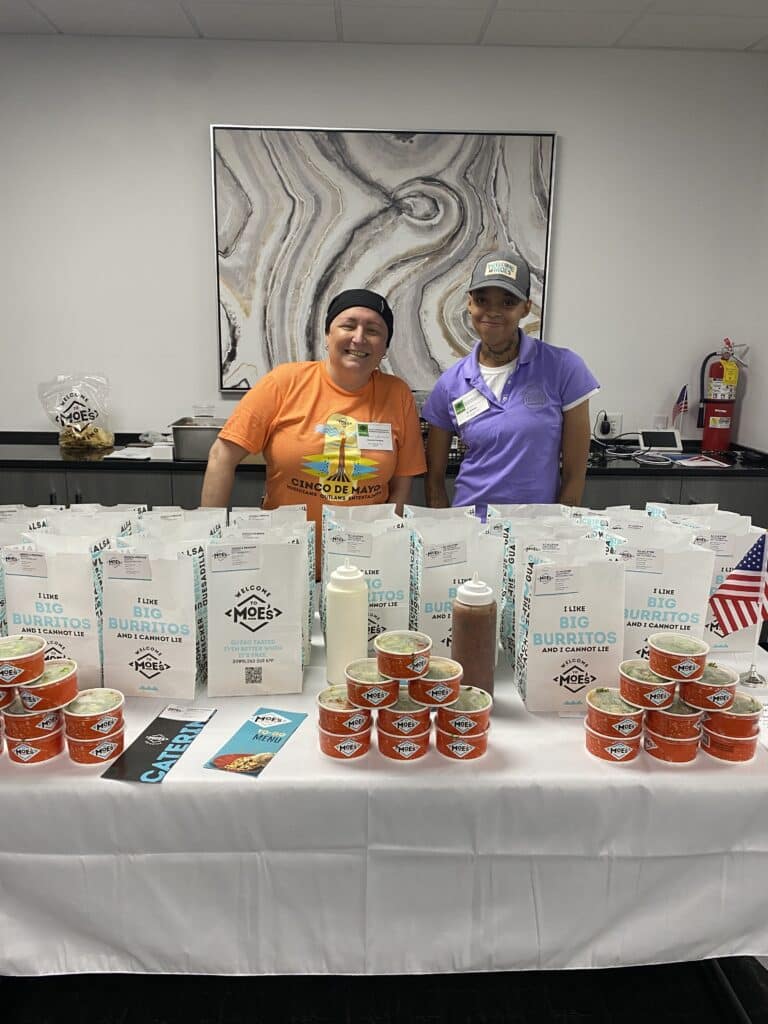
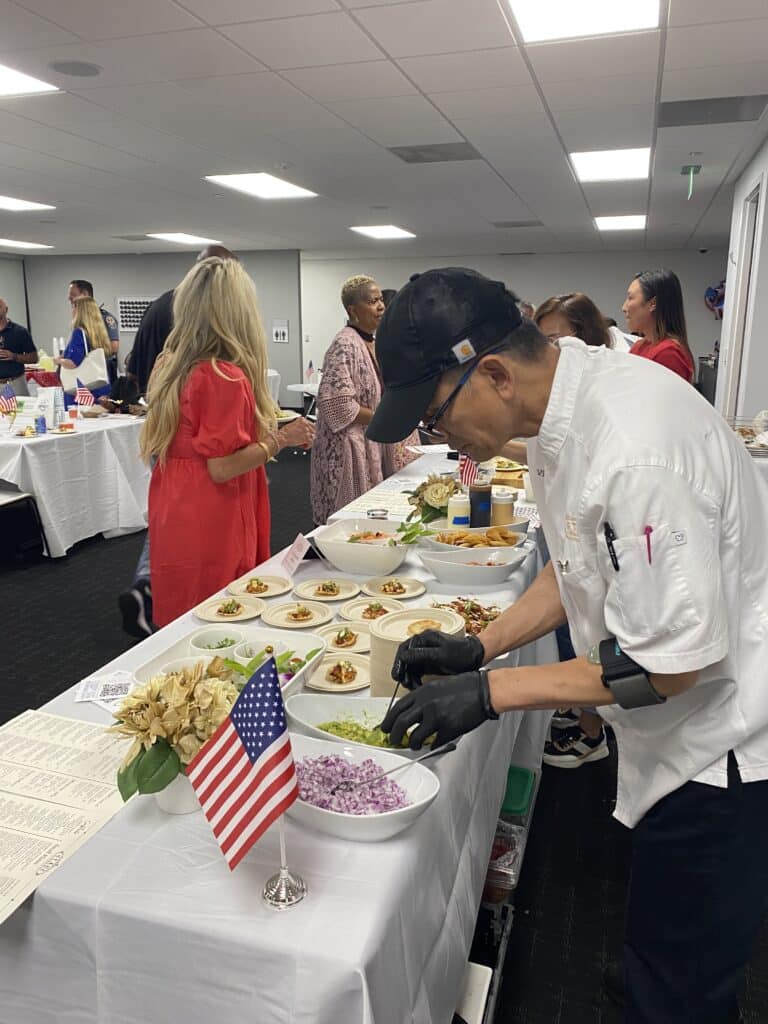
PECHE’s sister restaurant STAGE Kitchen & Bar was next door offering a tuna and salmon tostada with avocado, eel sauce, spicy mayo, and cilantro. This was easily one of my favorite bites of the night. The tostada was crunchy and light with clean and bright flavors. No kidding, I could probably eat this every day for lunch.
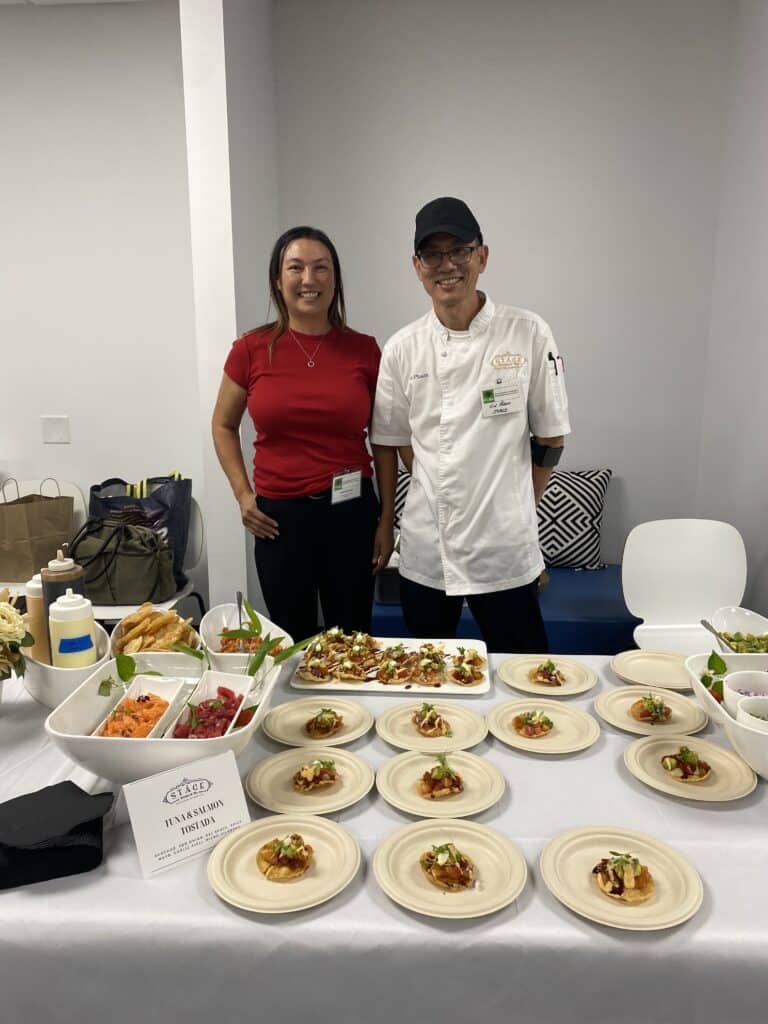

I moved on the Smoke’s Family Catering and owner Phillip Smoke had whipped up enough barbecue to feed an army. I had the pleasure of trying the smoked chicken with potato salad and it was the perfect pairing. Last but not least: dessert. I capped off the evening with a beautiful chocolate ganache-filled croissant with perfect lamination and flaky texture.
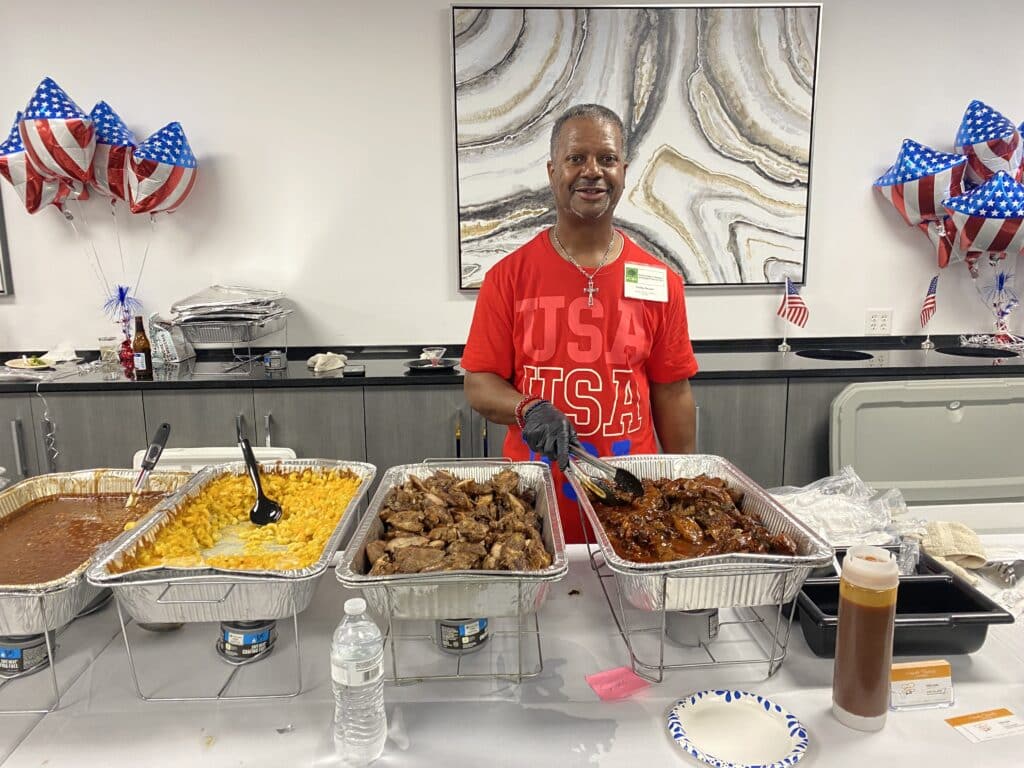
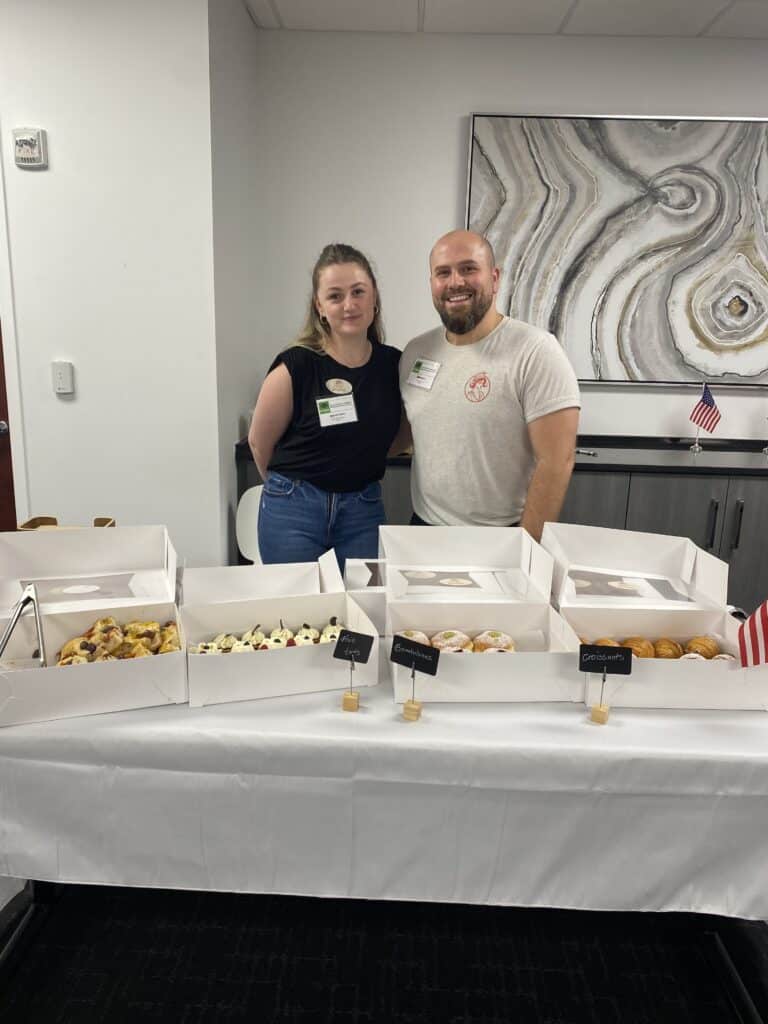

The inspiration behind the event
With a (very) full stomach, I caught up with PCBA President Lisa Proctor to talk about the event.
“We knew that COVID was really hard on a lot of our restaurants to get people back in,” said Proctor. “We wanted to do it in June because we wanted to celebrate our military. Everybody remembers them maybe on Memorial Day or different things, but June is the 80th anniversary of D-Day.”
“The military is always close to our heart,” she added. “We’re also very proud of our restaurants. They all have gone above and beyond.”
Tonight, the PCBA was honoring the Armed Forces and its brave veterans while bestowing two donation checks to very worthy causes.
The first check for $500 went to Folds of Honor. Since 2007, Folds of Honor has provided life-changing scholarships to the spouses and children of America’s fallen or disabled military. And now, their mission expands to the families of America’s first responders.
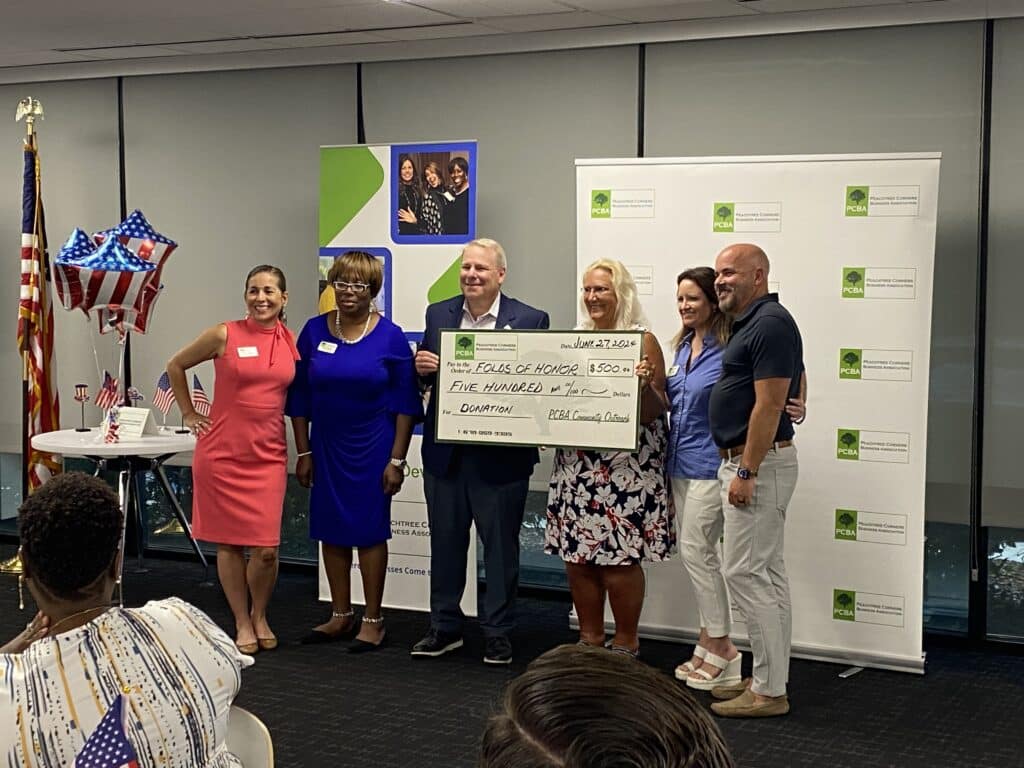
The second check for $500 was given to Light Up the Corners, a 501(c)(3) volunteer organization with an annual glowing, flashing, blinking, shining, nighttime running party and fundraiser in one. All proceeds from the event go to benefit less fortunate children and families in the Peachtree Corners community who are struggling by giving them the chance to participate in life-enhancing programs and activities at the Fowler YMCA.

Over the past 12 years, the PCBA has awarded 19 scholarships and donated more than $156,000+ back to the Peachtree Corners community.
Related
Business
Local Resident Opens AtWork Location in Peachtree Corners
Published
2 weeks agoon
July 10, 2024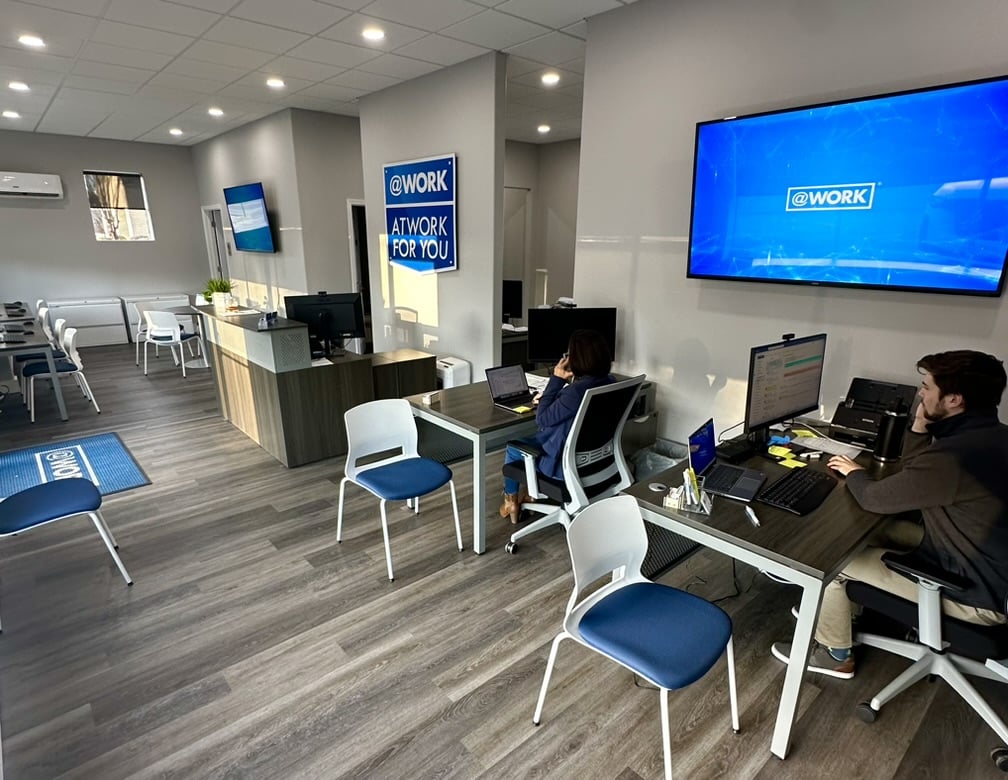
AtWork, one of nation’s leading staffing franchises, has opened its third Metro Atlanta location in Peachtree Corners, Georgia at 6185 Buford Highway, Suite E-100.
AtWork Peachtree Corners is locally-owned by Kamal Bhatia, an immigrant from India with decades of experience in hospitality and as the Senior Vice President of Operations of Atlanta-based Action Bartending School.
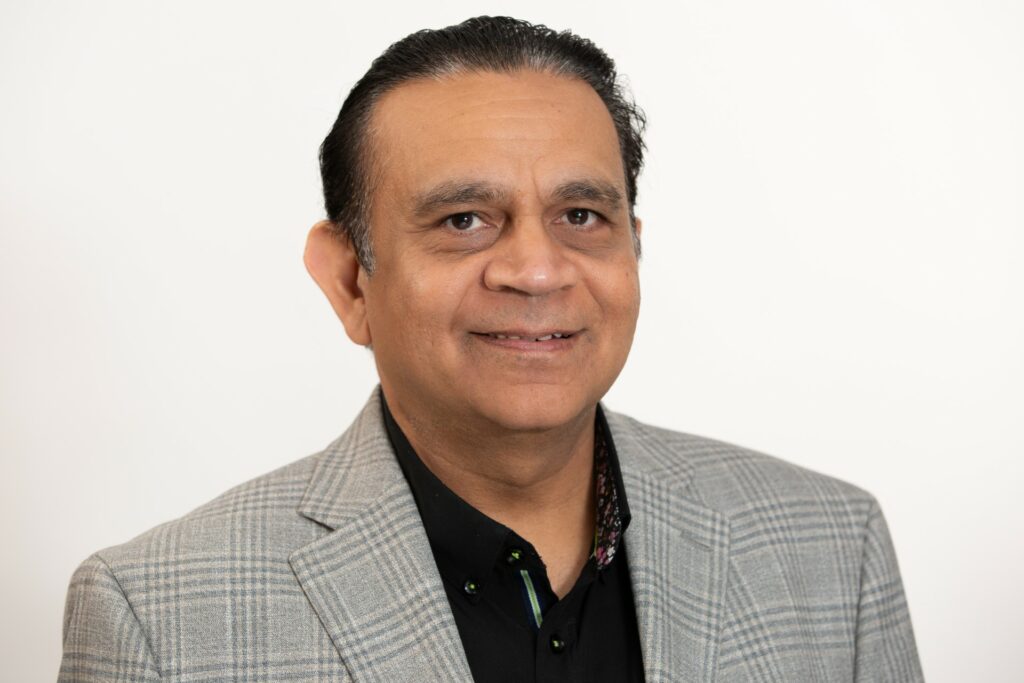
“There is an incredible need for AtWork’s services in Peachtree Corners,” said Bhatia. “Since migrating here in 1996, I’ve witnessed Atlanta evolve and sprout new communities north of the city, including my own. Peachtree Corners has become a hub for thriving businesses, and my goal with this location is to be a key resource between companies and job seekers to support the continued growth of our local economy.”
Bhatia’s son and daughter will assist him in the business.
“This is an opportunity to create a legacy company to ensure our community is supported for generations to come,” he said.
For more than three decades, AtWork’s mission has been to connect people with jobs and jobs with people. With more than 100 locations nationwide, AtWork puts nearly 40,000 individuals to work each year in administrative, light-industrial, accounting and finance, hospitality, IT and management-level positions at some of the nation’s largest and most recognizable companies.
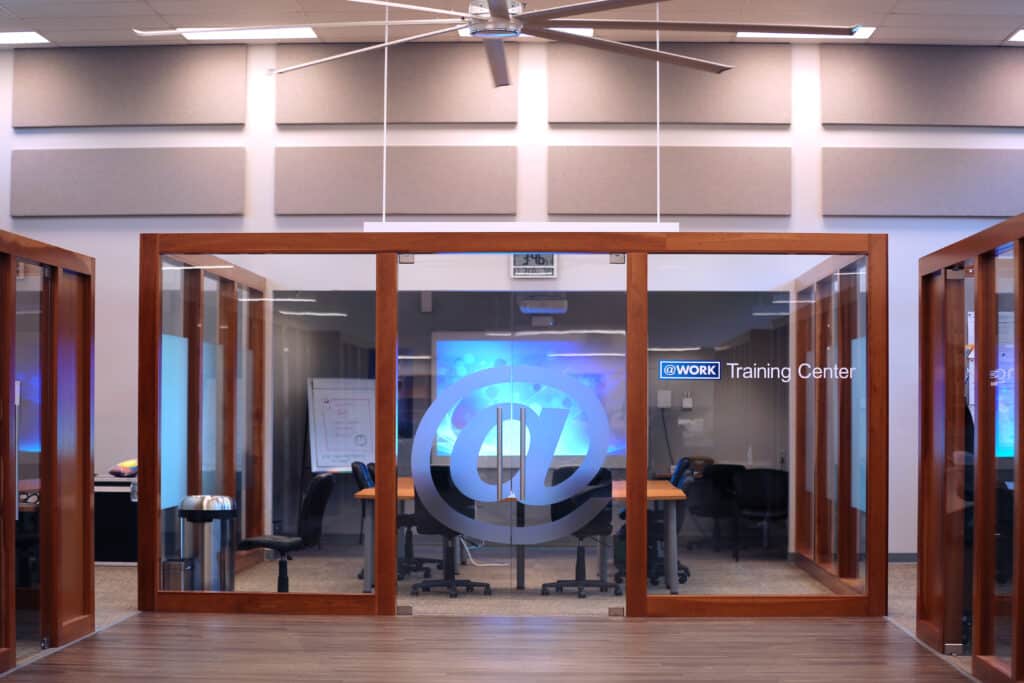
“We’re proud to open our doors in Peachtree Corners and provide a common place for both job seekers and growing businesses to turn for staffing solutions,” said Jason Leverant, President and COO of AtWork.
“AtWork will serve as a key resource to help employees thrive, businesses prosper and communities flourish. Kamal is the perfect partner to champion our mission and be a servant leader in her local community,” he added.
Related
Read the Digital Edition
Subscribe
Keep Up With Peachtree Corners News
Join our mailing list to receive the latest news and updates from our team.
You have Successfully Subscribed!

What’s going on at Jones Bridge Park and the Challenges of Urban Development

Taste of Peachtree Corners: PCBA Showcases Local Restaurants

The Forum Gives Sneak Peek of New Eateries and Community Spaces

Southwest Gwinnett Mayors Share Visions for the Future

8 Events Happening In and Around Peachtree Corners This August

Peachtree Corners Shines Bright with Light Up the Corners Glow Race this August

Peachtree Corners Shines Bright with Light Up the Corners Glow Race this August

The Forum Gives Sneak Peek of New Eateries and Community Spaces

8 Events Happening In and Around Peachtree Corners This August

Southwest Gwinnett Mayors Share Visions for the Future

Taste of Peachtree Corners: PCBA Showcases Local Restaurants

What’s going on at Jones Bridge Park and the Challenges of Urban Development

Local Resident Opens AtWork Location in Peachtree Corners

CHRIS 180 Expands its Services into Gwinnett County [Podcast]

Light up the Corners [Video]

Capitalist Sage: Business Leadership in Your Community [Podcast]

Cliff Bramble: A Culinary Adventure through Italy

Top 10 Brunch Places in Gwinnett County

A Hunger for Hospitality

THE CORNERS EPISODE 3 – BLAXICAN PART 1

Top 10 Indoor Things To Do This Winter

The ED Hour: What it takes to Remove Barriers from Education
Peachtree Corners Life
Topics and Categories
Trending
-
Business1 week ago
Taste of Peachtree Corners: PCBA Showcases Local Restaurants
-
Business2 days ago
The Forum Gives Sneak Peek of New Eateries and Community Spaces
-
City Government4 days ago
Southwest Gwinnett Mayors Share Visions for the Future
-
Around Atlanta4 days ago
8 Events Happening In and Around Peachtree Corners This August







